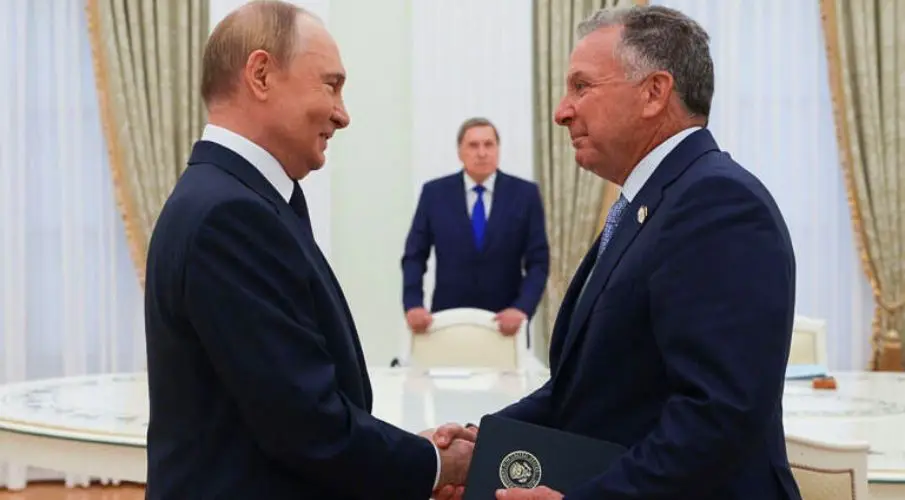When Steve Witkoff said on the Tucker Carlson show on March 21, 2025, that he had liked Putin, that Putin had been open with him and that he did not consider him a bad person, many heard only an awkward moment. They saw a businessman and special envoy who had spent too long in the orbit of a president who confuses proximity with strength. But today that sentence stands at the center of politics. Because this is the man who now sits at the table in Geneva when the future of Ukraine is being negotiated. He is part of the US delegation rewriting a plan that has left Europe and Ukraine stunned for days. The question that forces itself into view is as simple as it is bitter: how can someone mediate who openly expresses sympathy for the aggressor in an ongoing war?
Tucker Carlson: What do you think of Putin?
Witkoff: I liked him. I thought he was open and honest with me ... I do not regard him as a bad person.
The talks in Geneva have shown that the original 28 point plan has indeed been revised. The 28 points have been reduced to about 19, some formulations have been softened, and some of Ukraine's demands have been incorporated. But the spirit of the document remains. In Kyiv they say that they have to explain again and again what territorial integrity means and why the survival of the state is not something that can be traded away. The Kremlin, in turn, claims it has never received the revised draft officially and follows only the headlines circulating about the talks. This tactic is deliberate: Russia decides when a text qualifies as a basis for discussion - and Washington responds by further adjusting its drafts. Trump and Witkoff knew the contents of the original plan from day one - none of it came as a surprise to them.
That Witkoff sits in this room is therefore not a footnote but a political shock that strangely seems to trouble almost no one. His words about Putin should have triggered a nationwide debate, especially because this sentence was not uttered years ago but in March of this year. A man who describes Putin as trustworthy is helping to shape a peace proposal that was criticized from the start as a sale of Ukraine. This criticism was more than justified. And yet no one in Congress publicly asks how his personal assessment affects his work, even though many Republicans revolted against the plan. In Europe the silence is even louder. No foreign minister, no head of government has asked for clarification after the Carlson interview. They discuss wording, they sift through formulations, but the fundamental question remains unspoken: how neutral can a negotiator be who enters the talks with this attitude?
That Tucker Carlson gave him a platform at the time fits the man who has been one of the defining right wing voices in the United States for years. Carlson promotes a view that treats immigration as a danger, sees foreign conflicts as a burden for America and views leaders like Putin more as strategic actors than as adversaries. His programs have repeatedly amplified positions that downplay authoritarian regimes and cast doubt on Western alliances. When precisely such an environment becomes the echo chamber for remarks that relativize an ongoing war, every warning system should activate.
But Europe ignored that warning. Media reports mentioned Witkoff's remark in passing, and the only clearer point was that he brings neither diplomatic experience nor neutrality to the table. What is missing is the larger question: how could the US government believe that Ukraine would accept a negotiator who publicly stated he does not consider the man attacking their country to be bad? And how can Europe take a peace process seriously when one of its key architects operates with such a mindset?
In Geneva it is clear that the talks are shifting because trust is eroding. The Ukrainian delegation is fighting not only to change the wording but to alter the political direction of the document. It is the attempt to turn a text that began as a concession into something that can even serve as a basis for discussion. And while all this unfolds, Witkoff's sentence stands like a signal no one wants to interpret. It was spoken in March, in a studio that has normalized right wing politics for years. And now his words are unfolding their effect in the very place where decisions about war and peace are being made. That this connection is receiving so little attention is not just a failure. It is a political breakdown that will inevitably shape the further course of the negotiations. Because you cannot negotiate peace when one of the participants has already declared that he considers Putin trustworthy. And you cannot take a process seriously in which such sentences carry no consequences.
Investigative journalism requires courage – and your support.
Help sustain our reporting and our work. Even a small contribution helps us continue every day. Kaizen operates without ads, without subscriptions, without corporations, without political parties.
Independent – Critical – For Everyone
Thank you for making independent journalism possible.
Updates – Kaizen News Brief
All current curated daily updates can be found in the Kaizen News Brief.
To the Kaizen News Brief In English